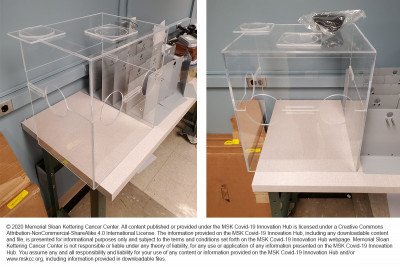
Anesthesiologists and biomedical engineers at Memorial Sloan Kettering Cancer Center (MSK) have modified the protective boxes commonly employed during airway procedures in infectious patients, such as intubation, creating a two-piece setup instead of the usual single unit. This simple innovation allows medical professionals better access if difficulties arise during airway procedures. The specs for the modified device are publicly available in an effort to share this safety-focused innovation with healthcare providers outside MSK.
The one-piece boxes currently used were devised to contain most of the aerosolized virus from spreading into the room, mitigating infectious exposure to the person performing the airway procedure. The MSK redesign adds a significant safety feature so that the upper lid section can be removed by an assistant while keeping the primary operator’s hands and airway equipment in place.
Hypoxic respiratory failure from COVID-19, the disease caused by the coronavirus SARS-CoV-2, has resulted in a massive increase in the need for ventilatory support of the most critically ill patients. To protect anesthesiologists, ICU physicians, ER providers, CRNAs, and other healthcare providers against the aerosolized virus emitted when carrying out airway procedures in such patients, hospitals across the country are increasingly using protective boxes.
“We believe our simple modification of going to a two-piece design will be very helpful in patients with difficult airways,” said Grant H. Chen, MD, an anesthesiologist at MSK. “Under normal circumstances around 2 percent of intubations are anticipated to be unexpectedly difficult. However, there have been reports that patients with COVID-19 are presenting with swollen airways, which may dramatically increase difficult intubations.”
“Protecting patients and healthcare providers during this pandemic requires real-time, on-the-ground innovation and information sharing with our colleagues around the nation and world,” said Takeshi Irie, MD, PhD, an anesthesiologist at MSK. “We want to get the word out about this critical design change, which may go a long way toward keeping our fellow healthcare providers safe during this public health crisis.”


